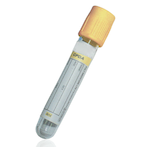Free T4 (FT4) Thyroxine
Specimen Volume
1 mL blood (minimum sample volume 100 uL)Sample Preparation
Centrifuge
Turnaround Time
1 daySample Processing In Laboratory
Usual
Sample Stability
Store at 4 ºC for up to seven days. For longer periods store at -20 ºC.
General Information
The thyroid hormone T4 is physiologically part of the regulating circuit of the thyroid gland and has an effect on the general metabolism. The major fraction of the total thyroxine is bound to transport proteins (TBG, prealbumin, and albumin). The free thyroxine (fT4) is the physiologically active thyroxine component. The determination of free thyroxine is an important element in clinical routine diagnostics. Free T4 is measured with TSH when thyroid function disorders are suspected. The determination of fT4 is also suitable for monitoring thyrosuppressive therapy. The determination of free T4 has the advantage of being independent of changes in concentration and binding properties of the binding proteins.
Patient Preparation
Patients receiving therapy with biotin (> 5mg/day) should not have samples taken for analysis until at least 8 hours post dose. Patients receiving treatment with lipid lowering agents containing D-T4 should have the treatment suspended 4-6 weeks prior to FT4 measurements to allow the physiological state to become re-established. Fractionated or unfractionated heparin may produce artefactual elevation in measured concentrations of free thyroid hormones.
Notes
Any influence that might affect the binding behaviour of the binding proteins can alter the result of the fT4 tests (e.g. drugs, NTIs (Non‑Thyroid‑Illness) or patients suffering from FDH (Familial Dysalbuminemic Hyperthyroxinemia). In rare cases, interference due to extremely high titers of antibodies to analyte or to analyte‑specific antibodies, streptavidin or ruthenium can occur. Please contact the laboratory for further advice if tests results are not consistent with the patient's medical history, clinical presentation and/or other findings, as further interference studies can be performed.
Reference Range
9.0 - 19.0 pmol/L
Source of Reference Range
Abbott DiagnosticsSpecifications
-
EQA Status:
NEQAS
- EQAS Scheme: Yes








